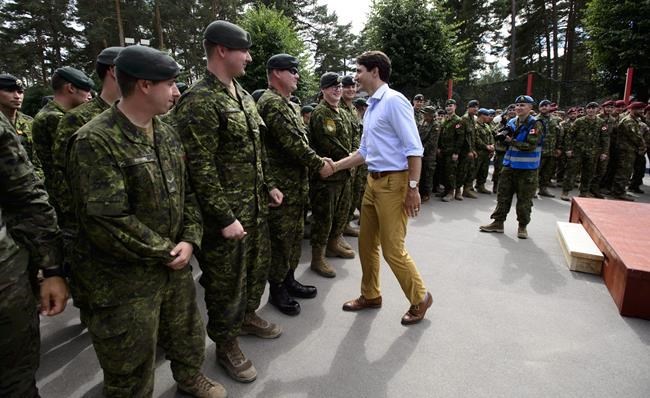OTTAWA — Latvia is crossing its fingers that it is up next after Prime Minister Justin Trudeau announced this week that Canada is extending and expanding its military mission in Ukraine in response to concerns about Russia.
In an interview, Latvian Ambassador to Canada Kārlis Eihenbaums said his countrymen are grateful for the 600 Canadian soldiers currently deployed to the Baltic state to defend against the threat of Russian attack.
The Canadians form the backbone and lead a 1,000-strong NATO battle group that includes soldiers from nine other alliance countries. The battle group is one of four such units across eastern Europe first established in 2017 as a check against Russia.
But Eihenbaums said his government is hoping the Canadian government will extend the mission beyond its current end date of March 2023 — and that Canada and other NATO members will add more forces to the mix.
“We hope it will be continued as the Canadians are doing a great job,” he said, adding in reference to both Russia and its ally Belarus, which also borders Latvia: “It is an extremely important signal now to our neighbours.”
Much of the current standoff between Russia and NATO has revolved around Moscow’s demand that Ukraine never be allowed into the transatlantic military alliance, which includes Canada, the United States and 28 European countries.
Yet the Kremlin has also demanded NATO withdraw all its forces from the territory of member states that once belonged to the Soviet Union, a list that includes Latvia. The alliance has rejected the demand, leading to fears of a new war in Europe.
It was in this context that Trudeau announced a three-year extension to Canada’s training mission in Ukraine and 60 additional trainers to the current 200-soldier contingent. Canada is also providing non-lethal equipment, intelligence and cyber help.
NATO members are also in talks about bolstering the alliance’s presence across eastern Europe as a further deterrent to war, with some allies such as France and Denmark having already announced additional commitments over the past week.
Trudeau on Thursday spoke with Latvian Prime Minister Krišjānis Kariņš, who thanked Canada for contributing troops to the battle group and leading it. A summary from Trudeau’s office said Kariņš also welcomed Canada’s decision on the Ukraine mission.
Yet while the summary did not mention any request for additional troops to Latvia, Eihenbaums said the two did discuss “how to improve” the battle group in Latvia. He added Defence Minister Anita Anand is scheduled to visit the country in the coming weeks.
Latvia’s long-serving foreign minister made no secret this week of his government’s view that NATO needs to step up its presence in the region.
“We are reaching the point where continuous Russian and Belarusian military buildup in Europe needs to be addressed by appropriate NATO countermeasures,” Edgars Rinkēvičs wrote on social media.
“It is time to increase allied forces' presence in the alliance’s eastern flank both as measures of defence and deterrence.”
The current battle group is designed for conventional warfare, meaning combat with a similar army such as Russia's. While Canada's contribution is mainly infantry with armoured vehicles, other partners have provided tanks, artillery and other equipment.
Similar battle groups led by Britain, Germany and the United States have been established in Estonia, Lithuania and Poland, respectively.
Some have expressed concern that the addition of more NATO troops on the alliance’s border with Russia will further escalate tensions at a time when cooler tempers need to prevail.
While he obviously doesn’t want war, Eihenbaums argued the best way to deal with Russia is through a show of resolve by reinforcing the alliance’s presence in his country and elsewhere across the region.
“Russians are basically like in a boxing ring,” he said. “They understand when you are strong. And you have to be strong. If we are able to send extra (troops), this will be appreciated and welcomed.”
Asked earlier this month whether the government would repatriate Canadian troops from Latvia and Ukraine if Russia attacked, Prime Minister Justin Trudeau noted Canada is in Latvia to defend the country and other NATO members from Russian incursions.
Eihenbaums noted the battle group is designed to fight if needed, adding: “There are sometimes questions about, 'If there is something, are they going to fight?' Of course they will go to fight. There's no question of all this.”
This report by The Canadian Press was first published Jan. 29, 2022.
Lee Berthiaume, The Canadian Press



